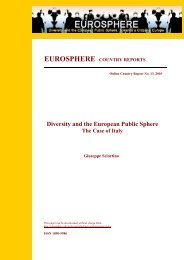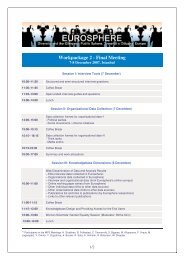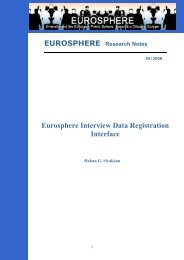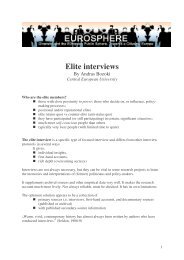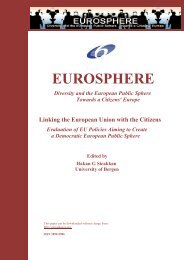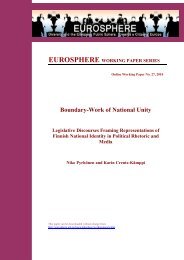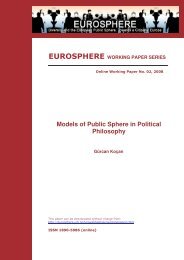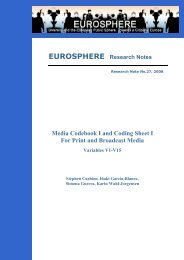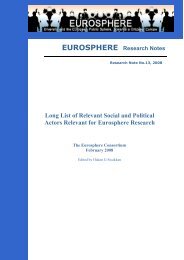Migrants, Minorities, Belongings and Citizenship. Glocalization and ...
Migrants, Minorities, Belongings and Citizenship. Glocalization and ...
Migrants, Minorities, Belongings and Citizenship. Glocalization and ...
Create successful ePaper yourself
Turn your PDF publications into a flip-book with our unique Google optimized e-Paper software.
the future. In this sense, the database is a flexible one with respect to different research<br />
<strong>and</strong> analysis orientations.<br />
2.2. Empirical project results<br />
The 7 publications in the Glocalmig Series mapped:<br />
- Legal rights <strong>and</strong> statuses of citizens <strong>and</strong> residents in six countries;<br />
- Features of selected glocal spaces in six countries;<br />
- <strong>Belongings</strong> <strong>and</strong> participation patterns of people attending to glocal spaces;<br />
- Alignments <strong>and</strong>/or misalignments between people’s belongings <strong>and</strong> the existing<br />
norms, laws, institutions, <strong>and</strong> policies of citizenship – quality of citizenships.<br />
The final volume of the Glocalmig Series addresses the last three of these topics<br />
comparatively. The first three of the above-mentioned research activities were important<br />
<strong>and</strong> necessary steps towards the scientific objectives of this project. However, in this<br />
final report, we will not present <strong>and</strong> analyze in detail the data collected about the legal<br />
rights/statuses <strong>and</strong> institutions relating to citizenship in our six case countries. Nor will<br />
we present or analyze the fieldwork data about glocal spaces <strong>and</strong> belongings. The aim of<br />
these parts was to establish the factual foundation which was necessary to reach<br />
preliminary conclusions about the relationships between belongings <strong>and</strong> citizenship<br />
frames – i.e. about the quality of citizenships – on the one h<strong>and</strong>, <strong>and</strong> on the other, to<br />
test the research tools developed in Glocalmig. For the purposes of this report, we will<br />
therefore focus on the end-products of our project:<br />
● Quality of citizenships as experienced by the attendants of glocal spaces.<br />
● The effectivity <strong>and</strong> fruitfulness of Glocalmig’s Research Tools.<br />
As mentioned in the beginning, the quality of citizenship is defined in this research as the<br />
degree of alignments <strong>and</strong>/or misalignments between individuals’ belongings <strong>and</strong> the<br />
formal citizenship laws, institutions, <strong>and</strong> policies. The first <strong>and</strong> second parts of Glocalmig<br />
mapped, respectively, the formal citizenship frames in terms of (1) legal rights/statuses<br />
<strong>and</strong> (2) institutions relating to citizenship <strong>and</strong> rights-exercise. The third part focused on<br />
the belongings <strong>and</strong> participation patterns of the people attending to selected glocal<br />
spaces. In each of these project parts, our point of departure was the similarities <strong>and</strong><br />
differences between the majority citizens in each country <strong>and</strong> those who are not<br />
considered as belonging to the majority population – e.g. historical native minorities,<br />
53



